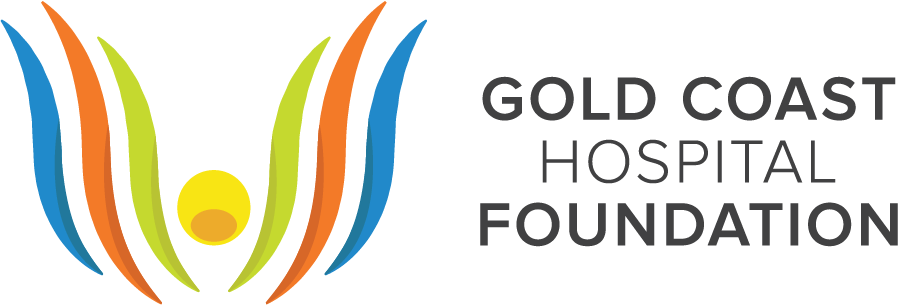Nov, 2025
Sixteen Years Old and Fighting for Every Breath: How Donors Gave Sophie a Second Chance at Life
When 16-year-old Sophie started year 11, she never imagined that halfway through she’d be clinging on to her life. She was your everyday teenager – going to school, hanging out with friends, challenging her parents, and pursuing her passion for International Law. But everything changed within days.
Sophie began feeling unwell during a school trip, experiencing flu-like symptoms. What seemed like a regular flu quickly turned into something more dangerous. When she returned home, her mum, Amanda, tested her and she was positive for Influenza A. She began experiencing pain when laughing or coughing and had difficulty breathing. Each breath became a struggle, so Amanda rushed her to their local hospital’s emergency department.
That decision saved her life.
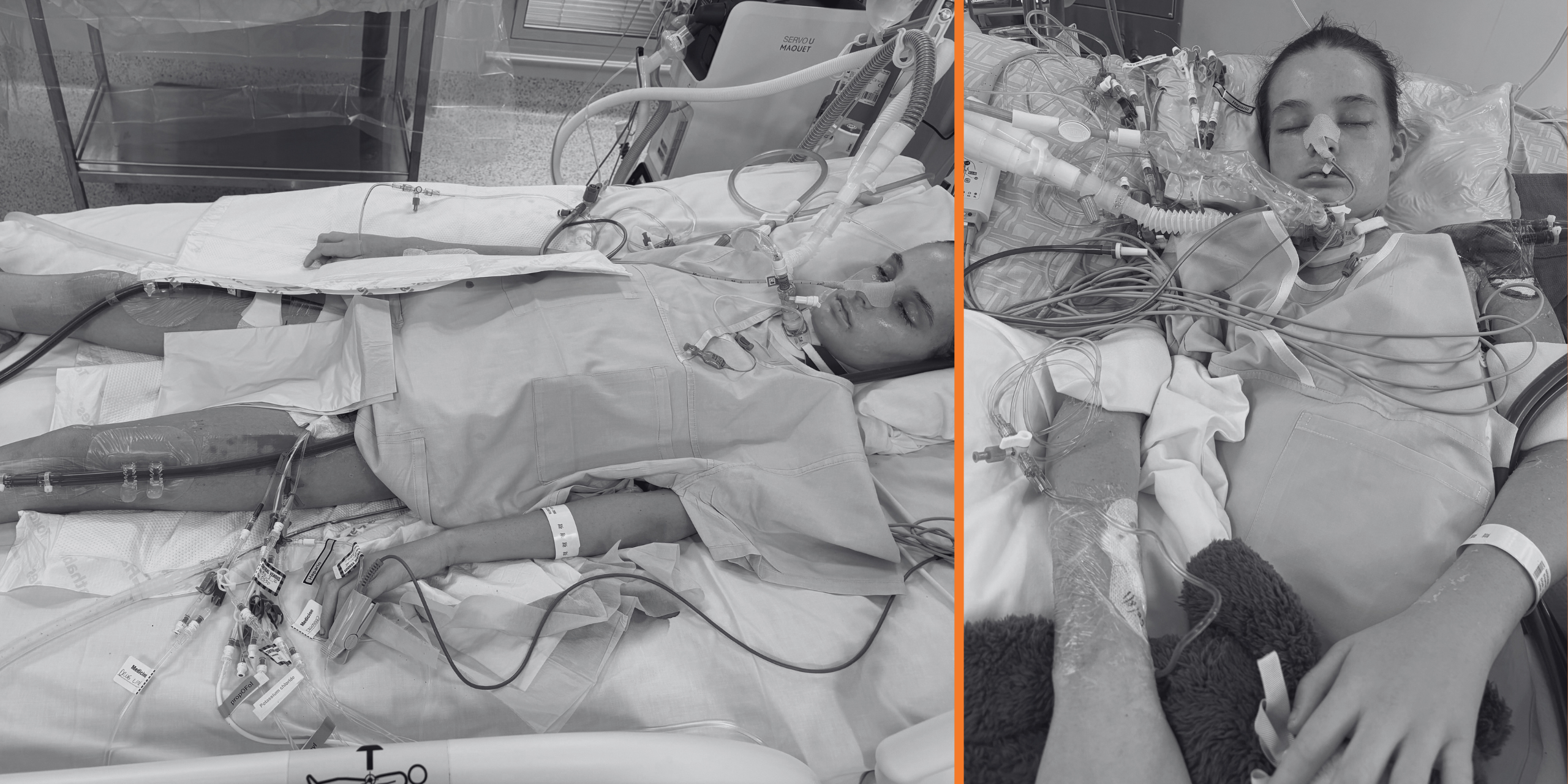
Sophie, fighting for her life, relied heavily on the ECMO life support machine to keep her stable.
Sophie deteriorated rapidly. Her oxygen levels dropped, and her lungs were failing. She needed life-saving intervention. Her parents were told she required ECMO life support – a machine that takes over the work of your heart and lungs. “I had never heard of ECMO before, but the doctors told me that without the machine she wouldn’t survive. Even with it, they said her chances weren’t great,” said Amanda.
“Never in my wildest dreams did I think this would happen to my child. I didn’t realise how sick she was. It was hard to comprehend that this machine was the only hope of saving my daughter’s life, and even then, it wasn’t guaranteed,” she added.
Then came another hurdle. The closest hospital with ECMO facilities was Gold Coast University Hospital (GCUH) – an hour and a half away. Sophie didn’t have that kind of time. Her lungs were in complete white-out, showing that no air was entering. She was slipping away and there was no time to waste. Every second counted.
Sophie’s only lifeline was the GCUH ECMO team and their specially equipped Mobile ECMO Vehicle, funded by the generosity of a Gold Coast Hospital Foundation donor. The team was urgently dispatched to Tweed Valley Hospital, where Sophie was rushed to meet them.
Sophie was haemorrhaging, she went into cardiac arrest and the team fought with everything they had to bring her back. When her heart began beating again, the ECMO team performed their procedure, carefully inserting tubes into her groin to feed her heart and allow the machine to take over the job of her heart and lungs. This gave her a fighting chance. She was stabilised and transported by ambulance to the GCUH Intensive Care Unit with an ECMO doctor by her side.
Her fight was far from over.
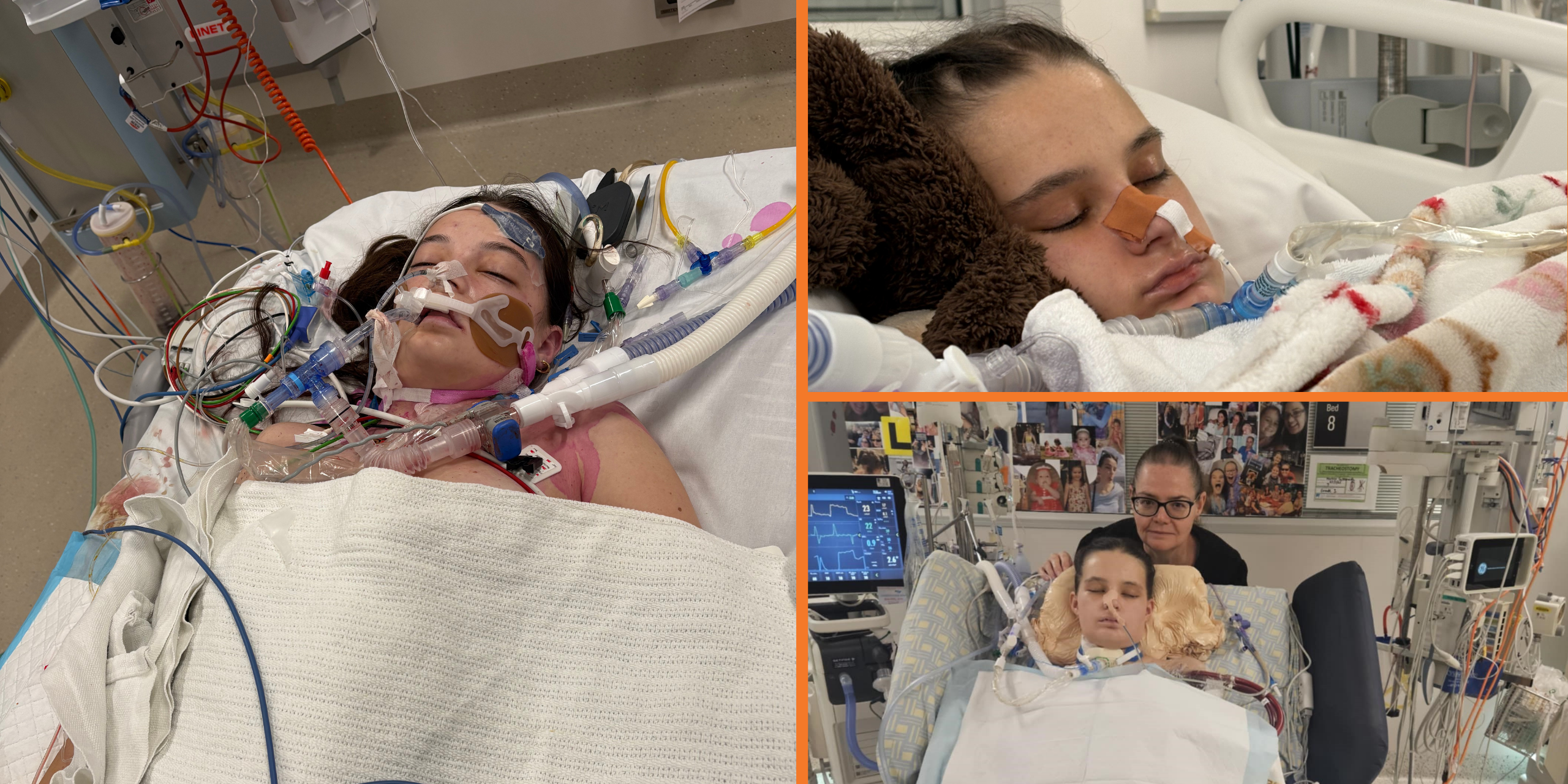
Amanda never left her daughters side, but seeing her this way never got easier.
For two months, Sophie’s condition remained critical. Each time the doctors thought she was improving, another setback came. From infections to sepsis and organ failure, her body was in a constant battle to stay alive.
She went into cardiac arrest again. This time, it took the ICU team 20-minutes of relentless resuscitation to bring her back to life. “It was frightening,” Amanda recalled, “She was so fragile. Even just moving her, her stats would drop. The machine could clot and need changing, and at one stage the ECMO team had a three-second window to replace it before her vitals would crash. Everything was a delicate balance.”
Sophie, in and out of sedation, missed the chance to celebrate her 17th birthday, unaware it had come and gone while she was in a medically induced coma.
Those months were incredibly difficult for Amanda and their family. The days were long and the pain felt endless. They lived in a constant state of fear, waiting helplessly while their daughter fought with everything she had. When it became too much, Amanda would step into the hallway to cry, often comforted by the ICU team.
“Nobody truly understands how critical the ECMO machine is. None of my family or friends had heard of it, and it was difficult for them to grasp how serious it was,” Amanda mentioned.
“Even when Sophie woke up, the machine couldn’t be removed. It was one of the most confronting things to see your child experience. Each morning you wake up and think, is this real?”
“It was a constant unknown of what the outcome would be,” she revealed.
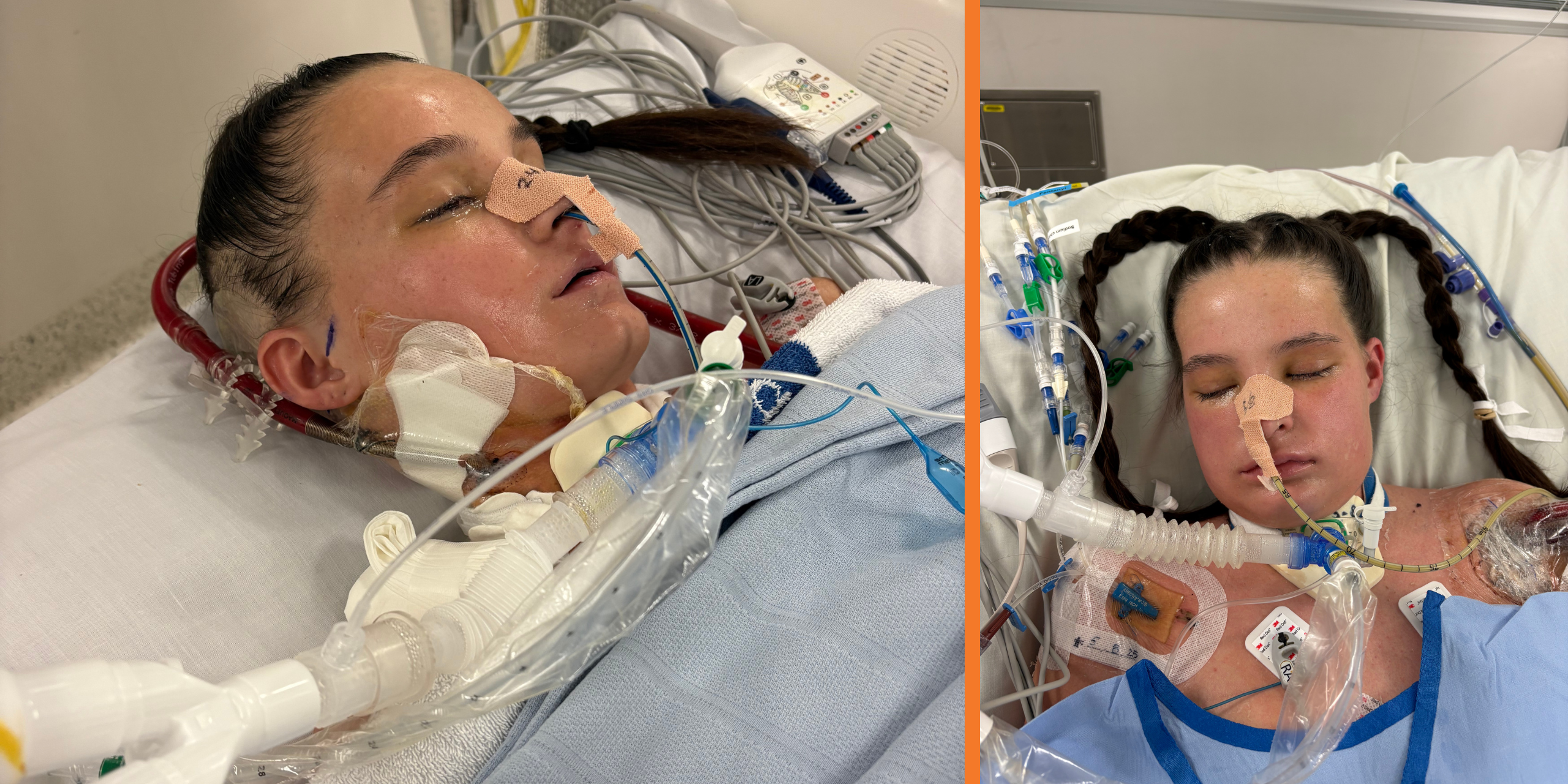
Suspended in time, Sophie’s still body fought with everything she had.
Sophie’s life depended entirely on the ECMO machine and the dedicated medical team keeping her alive. After two months she finally began to recover and became aware of what had happened.
“I don’t remember much from when I arrived at my local hospital, it’s all a blur,” Sophie recalled, “When I first woke up, I could see the tubes outside of me and I was just shocked and confused. I didn’t understand what had happened because it all was so quick”.
“It felt quick for you, but it had been a couple of months,” Amanda added.
Simple things became milestones as Sophie had to relearn everything, like lifting her head and walking ten metres with the help of ten people, still attached the ECMO machine.
“The doctors and nurses were incredible. They treated me like family. They made me laugh, gave me birthday gifts, and did everything they could to keep me motivated” she shared.
“One nurse, Kate, dressed up in a blow-up ballerina costume just to make me laugh. Everyone from ICU, the ward staff, and the physio team really cared about my recovery.”
“Each day I would check my chart, see how many days I had been in hospital and just cry. I remember checking at 76 days – and now it has been 113. On the day I left ICU for the ward, everyone lined the halls and clapped me out. It was really emotional,” Sophie remembered.
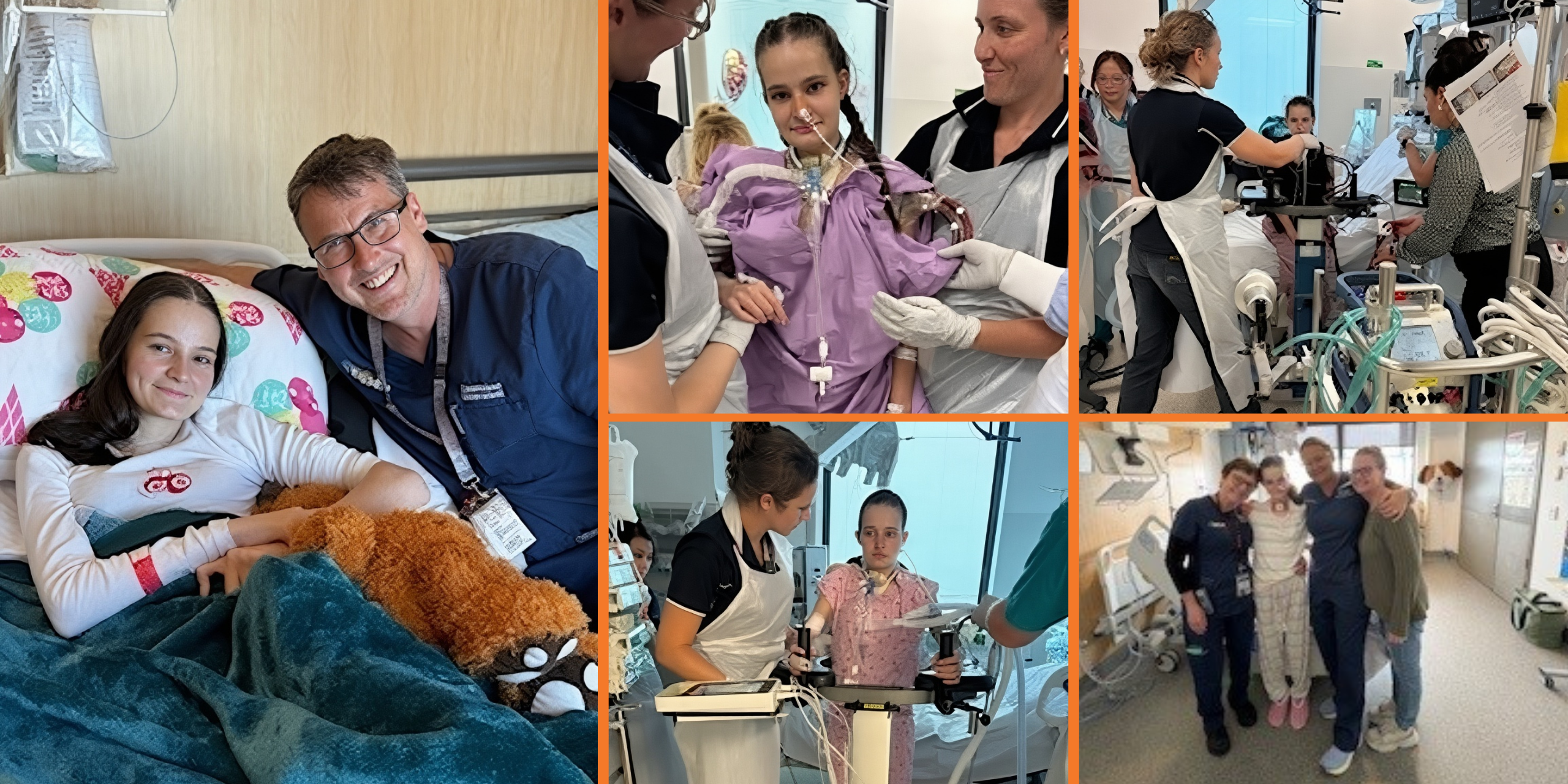
Sophie with a few of her incredible medical team, making sure she had the best possible care at all times.
Thanks to the mobile ECMO Vehicle and her medical team, Sophie will be home for Christmas, something her mum hoped for every day.
“Mum promised me while I was sedated that I would be home for Christmas,” Sophie said.
“This whole experience has made me more appreciative, even for little things like breathing, walking, talking – everything. I didn’t talk for three months,” she added.
When asked what she would say to those considering donating this Christmas, Sophie said, “It’s really important, because without donations, the hospital wouldn’t be able to do as much. With all the machines, the transport, the research – they saved my life”.
“The hospital saves lives every second. You might think your donation doesn’t make a big difference, but it really does. Every little bit helps.”
After 118 days in hospital, Sophie finally walked outside – feeling the sun on her face, breathing without machines, and headed toward the normal teenage life that became just a memory. After months of fighting for each breath, she could look ahead again: back to school, back to her friends, back to planning her future.
“I just wanted to be normal again. To study, see my friends, and not be lying in a hospital bed,” Sophie said, “I am so grateful to finally be going home”.
By her side, Amanda held her daughter’s hand, the same hand she had prayed would keep warm through the darkest moments. Leaving the hospital with Sophie was a moment she had dreamed of yet feared might never come.
Together, they walked out stronger, forever changed, and deeply grateful for the medical team, the ECMO service, and the generosity that made it all possible.
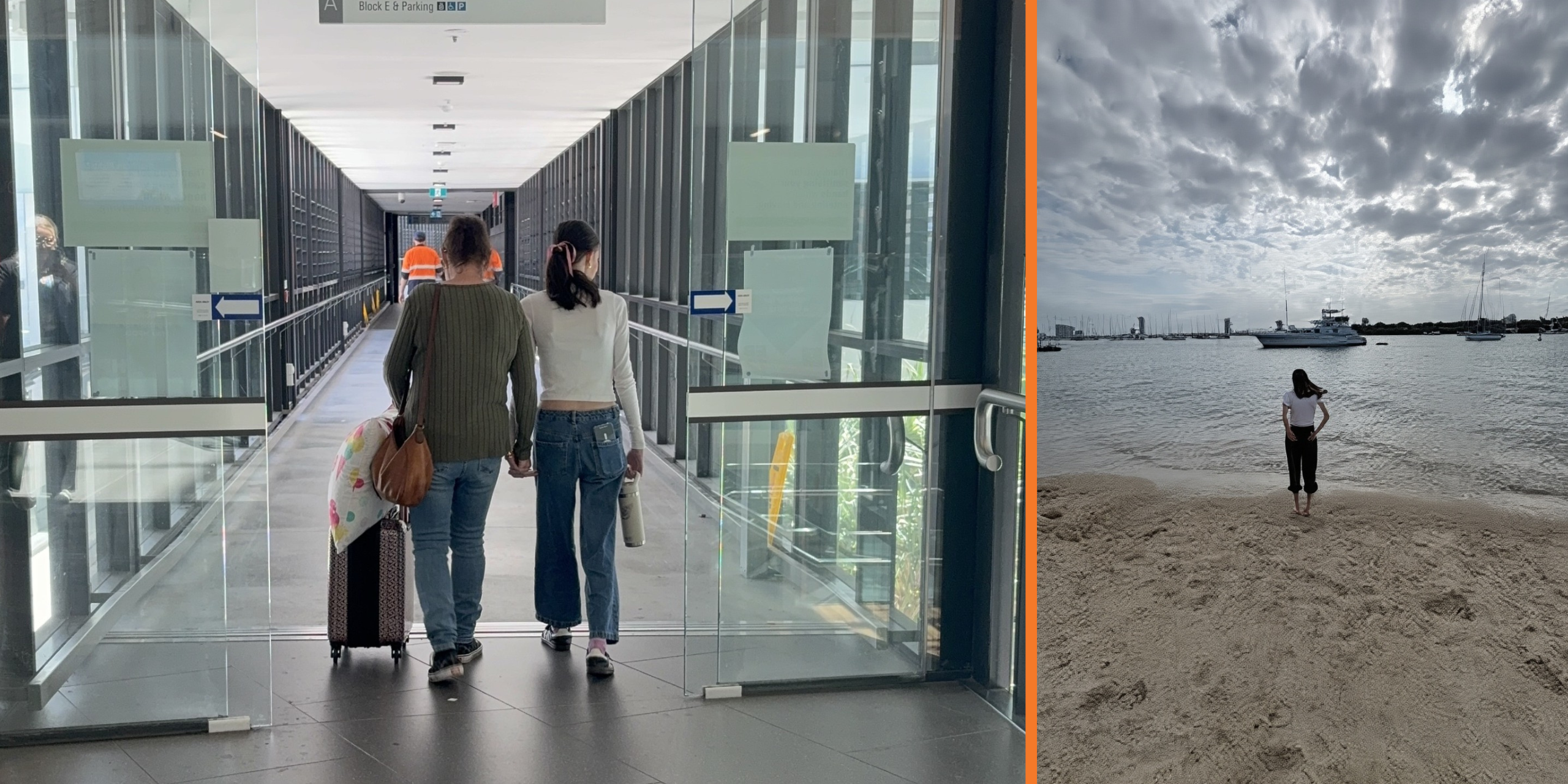
A moment months in the making – Sophie and Amanda leave the hospital after 118 gruelling days.
This Christmas, you can give another family the same chance Sophie had. Every second counts, so please take one to donate. You could save a life.
Your donation to Gold Coast Hospital Foundation will help fund vital medical equipment and crucial services for children, adults and families in need this Christmas.
